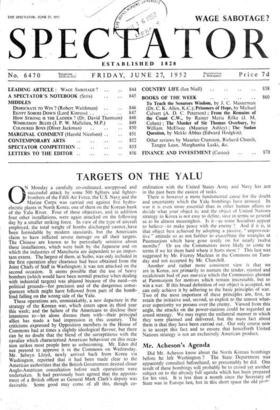TARGETS ON THE YALU
N Monday a carefully co-ordinated, unopposed and successful attack by some 500 fighters and fighter- bombers of the Fifth Air Force, the U.S. Navy, and the Marine Corps was carried out against five hydro- electric plants in North Korea, one of them on the Korean bank of the Yalu River. Four of these objectives, and in addition four, other installations, were again attacked on the following day by a smaller striking force. In view of the type of aircraft employed, the total weight of bombs discharged -cannot,have been formidable by modern standards, but the Americans claim to have inflicted severe damage on all their targets. The Chinese are known to be particularly sensitive . about these installations, which were built by the Japanese and on which the industries of Manchuria are dependent to an impor- tant extent. The largest of them, at Suiho, was only included in the first operation after clearance had been obtained from the Joint Chiefs of Staff in Washington; it was not attacked on the second occasion. It seems possible that the use of heavy bombers (which would have been normal practice when dealing with industrial targets) was abjured because of the need—on political grounds—for precision and of the dangerous conse- quences which might have followed from part of the bomb- load falling on the wrong side of the Yalu. These operations are, unmistakably, a new departure in the strategy of the Korean war, which enters upon its third year this week; and the failure of the Americans to disclose their intentions to—let alone discuss them with—their principal allies has made a bad impression in this country. The criticisms expressed by Opposition members in the House of Commons had at times a slightly ideological flavour, but there can be no doubt that the blend of the surreptitious with the cavalier which characterised American behaviour on this occa- sion strikes most people here as unbecoming. Mr. Eden did not pretend to approve it in the Commons on Wednesday. Mr. Selwyn Lloyd, newly arrived back from Korea via Washington, reported that it had been made clear to the American authorities that the British Government desired closer Anglo-Am6rican consultation before such operations were undertaken. It had previously been agreed that the appoint- ment of a British officer as General Mark Clark's deputy was desirable. Some good may come of all this, though co- ordination with the United States Army and Navy has .not in the past been the easiest of tasks.
There is however a more fundamental cause for the doubt and uncertainty which the Yalu bombings have aroused. In war it is even more essential than in other human affairs to decide what your object is; and the object of United Nations strategy in Korea is not easy to define, save in terms so general as to be almost meaningless. Is it—as some Socialists appear to believe—to make peace with the enemy ? And if it is, is that object best achieved by adopting a passive, " unprovoca- tive " attitude so as not further to exacerbate the wrangles at Panmunjom which have gone testily on for nearly twelve months? Or are the Communists more likely to come to terms if we hit them hard where it hurts most ? This last was suggested by Mr. Fitzroy Maclean in the Commons on Tues- day and not accepted by Mr. Churchill.
Another and rather more consistent view is that we are in Korea, not primarily to nurture the tender, stunted and recalcitrant bud of pax marxica which the Communists planted at Panmunjom for motives which remain inscrutable, but to win a war. If this broad definition of our object is accepted, we can only achieve it by adhering to the basic principles of war. Two of the most important of these principles are, first, to retain the initiative and, second, to exploit to the utmost what- ever superiority we possess over the enemy. Viewed from this angle, the attacks on the power-stations could be regarded as sound strategy. We may regret the unilateral manner in which they were planned and delivered, but the main fact about them is that they have been carried out. Our only course now is to accept this fact and to ensure that henceforth United Nations strategy is not an exclusively American product.


































